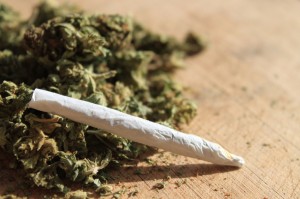Continuing Marijuana Use After a First Episode of Psychosis Increases Risk of Relapse
 A 2016 article in the journal JAMA Psychiatry reports that continuing to use cannabis after a first episode of psychosis increases risk of relapse. The study by Sagnik Bhattacharyya and colleagues employed longitudinal modeling to determine the role of cannabis use in psychotic relapse. The researchers followed 90 women and 130 men for two years after a first episode of psychosis, and found that the more marijuana they used, the more likely they were to have a relapse of psychosis.
A 2016 article in the journal JAMA Psychiatry reports that continuing to use cannabis after a first episode of psychosis increases risk of relapse. The study by Sagnik Bhattacharyya and colleagues employed longitudinal modeling to determine the role of cannabis use in psychotic relapse. The researchers followed 90 women and 130 men for two years after a first episode of psychosis, and found that the more marijuana they used, the more likely they were to have a relapse of psychosis.
Relapse rates were highest (59.1%) for participants who used pot continuously following their first episode of psychosis. Relapse rates were lower (36.0%) for those who used cannabis intermittently thereafter, and lowest (28.5%) among those who discontinued cannabis use after their first episode of psychosis.
A statistical test known as a cross-lagged analysis was used to establish that cannabis use affected later relapse, rather than relapse of psychosis leading to further cannabis use.
Another statistical strategy using fixed-effect models revealed that risk of psychotic relapse was 13% higher during times of cannabis use than during periods of no cannabis use.
These findings offer some hope that the likelihood of psychosis relapse can be reduced, since ongoing cannabis use is a risk factor that can be modified, unlike family history or genetics. Bhattacharyya and colleagues called for research into interventions that can help discourage cannabis use in people who have had a first episode of psychosis.
Editor’s Note: N-acetylcysteine, a nutritional supplement sold in health food stores, can reduce cannabis use compared to placebo in teen users.
Preventative Treatment Should Begin After First Manic Episode
Evidence from multiple studies has indicated the importance of beginning preventative treatment, particularly with lithium, early in the course of bipolar disorder. A 2016 comprehensive literature review by researcher Katie Joyce and colleagues in the International Journal of Bipolar Disorders concluded that psychoeducation and medication are more effective in bipolar disorder when applied in earlier stages of the illness rather than later stages.
Several studies suggest that treatment for bipolar disorder should be started specifically after the first manic episode.
A 2014 study by researcher Lars Kessing and colleagues in the British Journal of Psychiatry examined 4,700 patients treated with lithium in Denmark. Kessing and colleagues found that those who started treatment after one manic episode were less likely to find lithium ineffective than those who started later.
Another study by researcher Michael Berk and colleagues presented at the International Society for Bipolar Disorders found that after a first manic episode, a year of treatment with lithium was much more effective on all measures of outcome, including mania and depression ratings, brain imaging, and neuropsychological functioning, than a year when patients were randomized to quetiapine (Seroquel).
Researcher Lakshmi Yatham and colleagues presented research at the International Society for Bipolar Disorders showing that patients recovered from the neuropsychological deficits associated with a first episode of mania if they were well treated and had no further episodes, while those who had new episodes did not return to their baseline capabilities. This suggests that early treatment that prevents future episodes helps maintain a healthy brain.
Kessing and colleagues previously reported in the British Journal of Psychiatry in 2013 that patients randomized to two years of treatment in an outpatient clinic specializing in mood disorders following a first hospitalization for mania had 40% fewer recurrences of bipolar episodes over the next six years than those who received treatment as usual. These data indicate that early treatment, which may include psychotherapy, medications, mood charting (i.e. keeping a daily record of symptoms) and illness education, can improve the long-term course of illness. Lithium is often a key component of such treatment.
Editor’s Note: This type of intensive, ongoing treatment is not the norm after a first manic hospitalization in the United States, but it should be. Given the new data on the impact of starting lithium after a first episode of mania, and lithium’s superiority over quetiapine in the year following a first episode, lithium treatment should be standard following a diagnosis of bipolar disorder.
In the past, sometimes doctors have recommended waiting until a patient has had multiple episodes of mania before beginning preventative treatment with lithium. This now appears to be a mistake.
Lithium protects against depressive as well as manic recurrences, and there is also evidence that it increases hippocampal and cortical volume, helping prevent cognitive deterioration in those with mild cognitive impairment. Lithium is also the most effective mood stabilizer for preventing suicide, and it increases the length of telomeres (caps on the end of DNA strands), thus preventing a wide range of medical and psychiatric illnesses. Lithium may need to be combined with other drugs to achieve a complete remission, but using it after a first mania is a good place to start.


